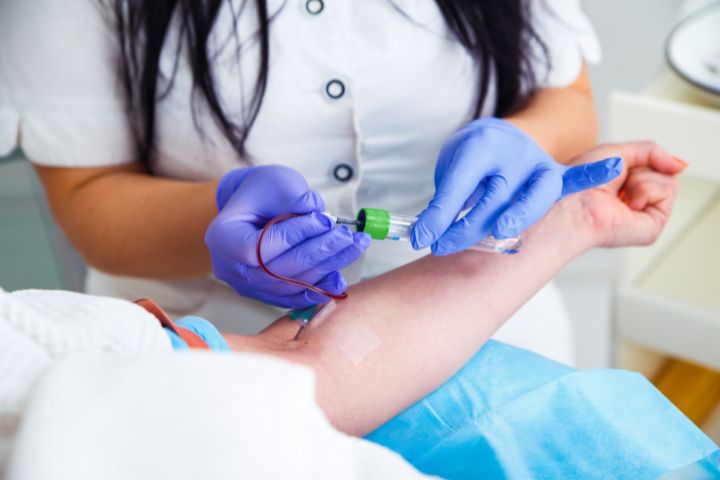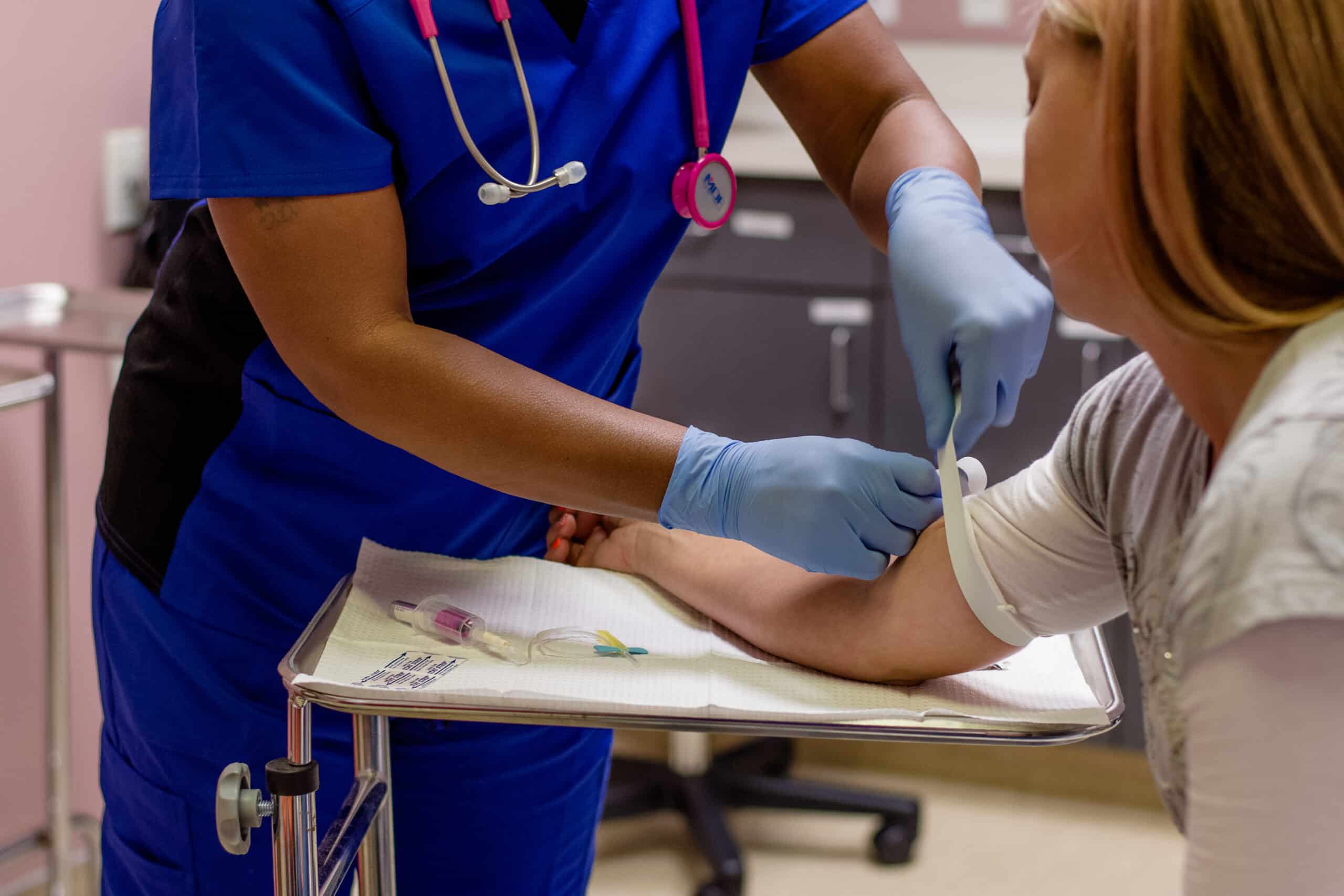Phlebotomy Courses Near Me: What You’ll Need to Start
Phlebotomy Courses Near Me: What You’ll Need to Start
Blog Article
The Path to Accreditation: Comprehending the Phlebotomy Training Training Course Trip and Its Significance
As you take into consideration the course to accreditation in phlebotomy, it's important to understand the function you'll play in medical care. Your training will cover essential abilities, from blood collection methods to patient communication. Each element of the program prepares you for the challenges in advance. Yet just what does the trip require, and why is accreditation so essential for your future career? Allow's explore these questions additionally.

The Role of Phlebotomists in Health Care
Phlebotomists play an important duty in the health care system, acting as the essential link in between clients and important diagnostic testing. You'll perform blood attracts, ensuring samples are accumulated accurately and securely. Your expertise assists in detecting medical problems, keeping track of health, and leading therapy decisions.
In your day-to-day communications, you'll need to establish count on with people, making them feel comfy during what could be a demanding experience. You're liable for labeling and dealing with examples meticulously to avoid contamination or mistakes, which can impact examination results.
Yet, you'll frequently work alongside doctors and nurses, communicating important information regarding people' conditions. Your role is essential in preserving the operations in medical care settings, guaranteeing timely and precise outcomes. By mastering your skills, you contribute meaningfully to patient care, making you a vital component of the clinical group. Embracing this responsibility is essential to your success as a phlebotomist.
Review of Phlebotomy Training Programs
When discovering phlebotomy training programs, you'll locate numerous kinds developed to fit different schedules and learning designs. Each program assists you create crucial abilities like blood collection and person communication. Comprehending these options is essential to choosing the appropriate course for your occupation.
Kinds of Training Programs
Several kinds of training programs are readily available for those seeking to end up being skilled in phlebotomy. You can pick from certification programs, which normally last a few months and concentrate on important abilities. There are likewise diploma programs that offer an even more detailed education, frequently lasting up to a year. If you're seeking a deeper understanding, an associate degree in a relevant field might be the appropriate fit. On the internet courses supply versatility for those stabilizing work or family dedications, enabling you to study at your own pace. In addition, some healthcare facilities and clinics use on-the-job training programs, offering sensible experience while you find out. Whatever course you select, each program aims to equip you with the needed skills for an effective phlebotomy job.

Secret Skills Established
Understanding phlebotomy needs a set of vital abilities that are developed via detailed training programs. Furthermore, communication abilities are basic; you'll need to connect with individuals, explain treatments, and put them at convenience. Each of these skills is essential for your success as a qualified phlebotomist, making you a beneficial possession in any kind of health care setup.
Secret Elements of a Phlebotomy Course
In a phlebotomy training course, you'll focus on crucial topics that prepared for your future career. You'll take part in hands-on training that allows you to apply what you have actually learned in real-world setups. Both the core educational program and useful experience are essential for your success as a phlebotomist.
Core Curriculum Introduction
While pursuing a phlebotomy training program, you'll experience a core curriculum designed to equip you with essential abilities and knowledge. Phlebotomy school. This curriculum typically consists of makeup and physiology, concentrating on the circulatory system and understanding blood parts. You'll additionally discover different kinds of blood collection techniques, consisting of venipuncture and capillary slit methods
Furthermore, infection control and safety and security methods are essential components, guaranteeing you know how to maintain a sterilized setting. You'll examine patient communication, stressing communication and compassion, which are important for alleviating person anxiety. Ultimately, moral and legal considerations will certainly be addressed, preparing you for real-world obligations. This fundamental understanding will certainly enable you to succeed as a phlebotomist and pop over to this site supply high quality care in scientific setups.
Hands-On Training Experience
Obtaining hands-on experience is an important component of your phlebotomy training course. This sensible training enables you to use what you've discovered in a real-world setting, boosting your skills and self-confidence. Phlebotomy Courses Near Me.
Furthermore, you'll obtain the chance to engage with people, which is vital for developing your communication skills. This mix of technical efficiency and social abilities is crucial for your success as a qualified phlebotomist. Ultimately, hands-on training is where theory fulfills technique, solidifying your expertise and readiness for qualification.
Certification and Licensing Needs
Before you can begin your career in phlebotomy, it is essential to understand the accreditation and licensing needs that differ by state. A lot of states require phlebotomists to hold an accreditation from an acknowledged organization, such as the National Phlebotomy Association or the American Society for Medical Pathology. These certifications typically entail passing an examination that tests your knowledge and abilities in the field.
In enhancement to accreditation, some states have certain licensing needs. You might require to finish a particular number of hours in professional practice, send proof of training, or go through a background check. It is important to investigate your state's guidelines to make certain you fulfill all required standards.
Remaining notified about these demands visite site not only helps you safeguard a placement yet also boosts your trustworthiness as a specialist. By satisfying these needs, you'll be well on your means to an effective occupation in phlebotomy.
Hands-On Training and Practical Experience
Hands-on training and functional experience are important components of your phlebotomy education and learning, as they enable you to use academic expertise in real-world situations. Throughout your training, you'll involve in supervised venipuncture, find out correct strategies, and come to be aware of different blood collection equipment. This straight involvement is important for building your confidence and refining your skills.
You'll work very closely with skilled experts that can lead you with the subtleties of client communication and sample handling. Each method session not only strengthens your understanding but additionally prepares you for the hectic atmosphere of health care settings.
Furthermore, numerous programs include clinical rotations, permitting you to experience diverse settings, from healthcare facilities to outpatient facilities. This exposure aids you adapt to various difficulties and individual demands, ensuring you're well-prepared for your future function. Welcome these chances, as they're important to becoming an experienced and caring phlebotomist.
Difficulties Dealt With Throughout Training
While acquiring hands-on experience is crucial, it's crucial to identify the challenges that can emerge during your phlebotomy training. Furthermore, understanding the skills required for blood draws takes technique; you may struggle with method originally.
Time monitoring can also be a difficulty, as balancing theory, sensible sessions, and individual commitments can really feel intimidating. You may encounter varying learning speeds amongst your peers, bring about feelings of insecurity if this you think you're dropping behind. Adapting to the various personalities of instructors can be tough, as each might have a distinct mentor style.
Identifying these challenges early can prepare you for success and help you establish durability throughout your training journey.
Occupation Opportunities After Qualification

As you get experience, you could also take into consideration specializing in locations like pediatric or geriatric phlebotomy, catering to specific individual requirements. Some phlebotomists choose to progress their professions by ending up being laboratory service technicians or seeking further education in healthcare areas.
Additionally, your certification can result in functions in training or overseeing new phlebotomists, enabling you to share your understanding. With the health care market constantly growing, your skills will constantly remain in need, leading the way for a steady and meeting occupation. Accept the chances awaiting you!
Frequently Asked Questions
What Is the Typical Duration of a Phlebotomy Training Training Course?
Phlebotomy training courses usually last around four to 8 weeks. You'll take part in hands-on method, classroom guideline, and on the internet knowing. Finishing this training prepares you for qualification and a satisfying career in healthcare.
Are Online Phlebotomy Courses Available?
Yes, on the internet phlebotomy courses are readily available. They offer flexibility and ease, permitting you to examine at your very own rate. Just verify the program is accredited to satisfy qualification needs and obtain useful abilities for your profession.
Just How Much Does Phlebotomy Training Generally Cost?
Phlebotomy training usually sets you back between $700 and $2,500, depending on the program and area. You ought to consider factors like training course length, consisted of materials, and hands-on experience when selecting the ideal training for you.
What Prevail Prerequisites for Phlebotomy Training?
Common requirements for phlebotomy training typically include a high college diploma or GED, booster shots, and a background check. Some programs might additionally require basic healthcare knowledge or qualifications, ensuring you're planned for hands-on training.
Can I Function While Completing My Phlebotomy Training?
Yes, you can work while completing your phlebotomy training. Several pupils equilibrium work with their researches, but make sure to manage your time properly to ensure you meet both work and training commitments efficiently.
Report this page